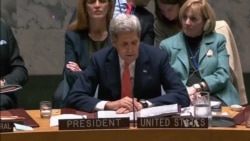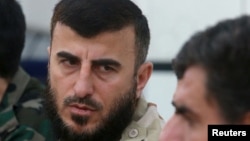As the United Nations prepares to facilitate January talks on a political transition in Syria, some key questions remain unanswered.
Those questions include the status of Syrian President Bashar al-Assad during the talks and the ability of Syria's moderate opposition to function as a cohesive unit.
There are also questions regarding whether the death of a rebel group leader in a December airstrike could taint the views of opposition groups taking part in the U.N.-led talks in Geneva.
Last week, the U.N. Security Council endorsed a road map for Syria backed by world powers in the International Syria Support Group.
The plan sets, as a target, the establishment of a transitional government in Syria within six months, followed by elections within 18 months.
It also calls for a cease-fire that would be implemented when political talks begin in January. The cease-fire would not include terrorist groups such as the Islamic State.
Assad's fate
While presiding at the Security Council session, U.S. Secretary of State John Kerry acknowledged differences among world powers on the future status of Assad.
"President Assad, in our judgment, and not everybody shares this, but the majority of people in the ISSG (International Syria Support Group) believe that President Assad has lost the credibility to be able to unite the country," Kerry said.
Assad receives support from ISSG members Russia and Iran.
The uncertainty over Assad's role during political transition talks could be a key stumbling block, said Perry Cammack, a Middle East analyst at the Carnegie Endowment for International Peace.
"That really is the key question in this entire thing," Cammack said. "I see no indication that he has any interest in stepping down."
‘Fractious' opposition
He was also not hopeful that Syria's "fractious" opposition groups could keep themselves united during the talks with the Syrian government.
"There is reason for doubt but again, in my view, it is better to have a process, to have dialogue, than not," Cammack said.
There is opposition concern that the Syrian government or its ally, Russia, has intentionally targeted groups that could be part of the upcoming talks, said American Foreign Policy Council analyst Andrew Peek.
The Syrian government has claimed responsibility for the airstrike this month that killed Jaysh al Islam leader Zahran Alloush.
Alloush's group took part in a recent opposition group meeting in Saudi Arabia.
"I think that is going to destroy the credibility of this process for the moderate Syrian opposition," Peek said.
He said, ultimately, what may be needed to end Syria's civil instability and the unrest and violence caused by the Islamic State is a "redistribution" of power — something that he said cannot happen with Assad as president.
"That can only happen if the Alawite community itself moves away from Assad," he said.
Peek said Assad's Alawite sect supporters would be unlikely to take this action unless the capital, Damascus, was threatened.







